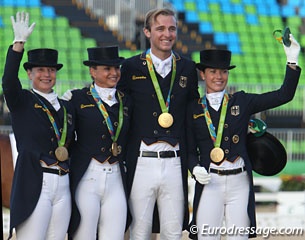
Isabell Werth captained the German team to Team Gold after winning the Grand Prix Special and beating Charlotte Dujardin on Valegro at the 2016 Olympic Games in Rio de Janeiro, Brazil, on Friday 12 August 2016. The German power train was unstoppable in Rio and with a historic team average of 81.93% they claimed the gold medal. Great Britain secured silver, while the U.S.A. was back on the Olympic podium with bronze after a 12-year old hiatus.
The Grand Prix Special was the second leg of the Team Championship competition and while the Grand Prix was a sneak peak of what the podium places could be, the battle was not yet fought. Today's Special wasa battle in open field with guns ablazing. While the German blitzkrieg was unpreventable, the silver and bronze positions were wide open for the taking. Routiniers made mistakes, newcomers succumbing to nerves; all the ingredients were there for a true Championship thriller.... and this time fortunately the battle was without blood! Although in the prize giving ceremony a frolicky Cosmo knocked his groom to the ground, who had to be carried out of the arena with a minor laceration.
"Wir Schaffen Das", Gold for Germany
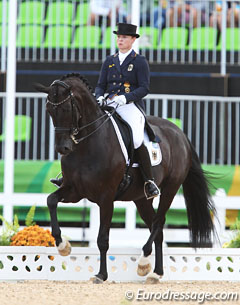 Germany is on unprecedented best form: world class horses with pure, classical dressage riding on top. The judges did get a bit carried away in their enthusiasm for the beauty of the sport and scores kept climbing and climbing, despite some imperfections here and there (to which eyes seemed closed). Overall the panel of seven experienced judges - which includes Baarup, Clarke, De Wolff, Rockwell, Holler, Alonso, and Lang -- is doing a great job, so far, and they are ranking the horses appropriately.
Germany is on unprecedented best form: world class horses with pure, classical dressage riding on top. The judges did get a bit carried away in their enthusiasm for the beauty of the sport and scores kept climbing and climbing, despite some imperfections here and there (to which eyes seemed closed). Overall the panel of seven experienced judges - which includes Baarup, Clarke, De Wolff, Rockwell, Holler, Alonso, and Lang -- is doing a great job, so far, and they are ranking the horses appropriately.
Today Isabell Werth topped the board. It was a bit of a surprise consdering that Weihegold (by Don Schufro x Don Schufro) still has a few weaknesses, but Werth definitely give it her all and rode a brilliant test nonetheless. The trot work was very active with flowing half passes, the passage was super ladylike: elegant, graceful and perky. It's a pity that this sparkle in the passage can not be reproduced in the trot extensions, which barely achieve one hoof overstep and which are limited in the shoulder freedom. The piaffe has developed tremendously and the black mare sits well on the hindquarters, but in the transition out she still loses the hindlegs which fling out instead of stepping under. The tempi changes were very correct, the left pirouette was more scopy than the right one. The mouth was a bit more closer than usual but Weihegold could still relax the lips more and refrain from showing her teeth. Werth once again showed her mastership as a competition rider: extreme focus while having fun on a horse that is properly trained the classical way. They scored 83.711% for victory with 80.7 as low mark and a whopping 87.3% as high mark.
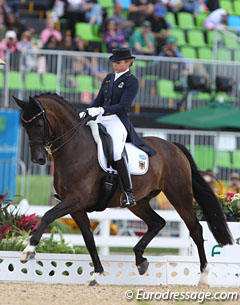 Werth led the German team to gold, but her efforts only supported the tremendous 80% + scoring achievements of team mates Dorothee Schneider and Kristina Sprehe-Broring. Schneider and the 10-year old Showtime could easily have been the winners of the day as they produced their best ride ever. The appealing bay gelding executed massive trot extensions, which do appear a bit hurried. Also the half pass right was slightly over tempo but had huge crossing. The passage is so lightfooted, regular and high off the ground. The piaffe has very nice sit and rhythm. The second piaffe was a bit early on the marker. The flying change after the canter half pass right was short, the tempi changes on the diagonal were good, but one change in the nine one tempi's was short. In the extended canter the horse develops much power but stays too short in the neck. The only booboo in the ride was in the right pirouette in which he changed lead. Had they been faultfree, the victory could have been theirs. With 82.619% they were third. Schneider's scores went from 81.0% to 84.50%
Werth led the German team to gold, but her efforts only supported the tremendous 80% + scoring achievements of team mates Dorothee Schneider and Kristina Sprehe-Broring. Schneider and the 10-year old Showtime could easily have been the winners of the day as they produced their best ride ever. The appealing bay gelding executed massive trot extensions, which do appear a bit hurried. Also the half pass right was slightly over tempo but had huge crossing. The passage is so lightfooted, regular and high off the ground. The piaffe has very nice sit and rhythm. The second piaffe was a bit early on the marker. The flying change after the canter half pass right was short, the tempi changes on the diagonal were good, but one change in the nine one tempi's was short. In the extended canter the horse develops much power but stays too short in the neck. The only booboo in the ride was in the right pirouette in which he changed lead. Had they been faultfree, the victory could have been theirs. With 82.619% they were third. Schneider's scores went from 81.0% to 84.50%
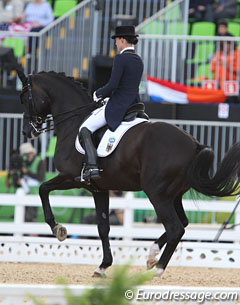 Kristina Bröring-Sprehe and her 15-year old Hanoverian stallion Desperados were not as high level as they were in the Grand Prix. The rider had a strong contact with the left snaffle throughout the test. The first trot extension was wonderful though and there was much swing and flow in the trot tour in general with smooth half passes and transitions to and from passage. The horse was often not straight but bent to the inside depending on the lead. The walk was well ridden but Desperados anticipated the first piaffe and could not control his eager. The serpentine with piaffe and passage was beautiful, but the horse ran a bit away in the strike off to canter. In the two tempi changes the hindquarters swung more than usual to the right, while the ones were much straighter. The extended canter was big but the flying change at the end of the diagonal a bit wild. Also in the pirouette Desperados lost some of the collection. The final passage on the centerline was not entirely even with more left hind leg activity. The pair scored 81.401% to finish.
Kristina Bröring-Sprehe and her 15-year old Hanoverian stallion Desperados were not as high level as they were in the Grand Prix. The rider had a strong contact with the left snaffle throughout the test. The first trot extension was wonderful though and there was much swing and flow in the trot tour in general with smooth half passes and transitions to and from passage. The horse was often not straight but bent to the inside depending on the lead. The walk was well ridden but Desperados anticipated the first piaffe and could not control his eager. The serpentine with piaffe and passage was beautiful, but the horse ran a bit away in the strike off to canter. In the two tempi changes the hindquarters swung more than usual to the right, while the ones were much straighter. The extended canter was big but the flying change at the end of the diagonal a bit wild. Also in the pirouette Desperados lost some of the collection. The final passage on the centerline was not entirely even with more left hind leg activity. The pair scored 81.401% to finish.
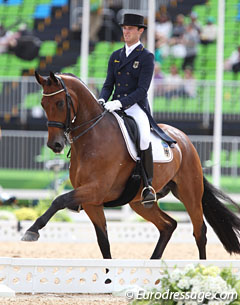 The younglings on the German team, 21-year old Sönke Rothenberger and the 9-year old Cosmo, put in more than an admirable effort. The trot extensions were world class, the passage was supple, regular and bouyant. The horse lost the clarity in the rhythm in the collected walk before the piaffe. The first piaffe and second piaffe were lovely, but the transitions need to be solidified. In the trot half passes the horse loses a bit uphill tendency. This combination has it all to crack the 80% barrier but they have to stay faultfree for that. Today there were mistakes in both the one and two tempi changes and there was an issue in the extended canter that pushed the score down to a final 76.261% and 10th place. As fourth German team member they are not allowed to start in the freestyle final. Still Rothenberger's German team debut is crowned with an Olympic team gold medal. Not bad at all!
The younglings on the German team, 21-year old Sönke Rothenberger and the 9-year old Cosmo, put in more than an admirable effort. The trot extensions were world class, the passage was supple, regular and bouyant. The horse lost the clarity in the rhythm in the collected walk before the piaffe. The first piaffe and second piaffe were lovely, but the transitions need to be solidified. In the trot half passes the horse loses a bit uphill tendency. This combination has it all to crack the 80% barrier but they have to stay faultfree for that. Today there were mistakes in both the one and two tempi changes and there was an issue in the extended canter that pushed the score down to a final 76.261% and 10th place. As fourth German team member they are not allowed to start in the freestyle final. Still Rothenberger's German team debut is crowned with an Olympic team gold medal. Not bad at all!
Faultfree Is the Message, Great Britain Gets Silver
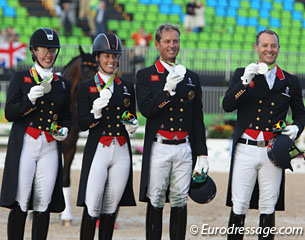 While Charlotte Dujardin and Valegro gave an impression of still being untouchable in the Grand Prix - despite some loss of quality in the piaffe work - today in the Special that "league of their own" aura was gone. The pair no longer affords the leniency of making small mistakes and getting away with now that such strong Germans are breathing down their neck. It now looks like Valegro's second individual gold is no longer a given.
While Charlotte Dujardin and Valegro gave an impression of still being untouchable in the Grand Prix - despite some loss of quality in the piaffe work - today in the Special that "league of their own" aura was gone. The pair no longer affords the leniency of making small mistakes and getting away with now that such strong Germans are breathing down their neck. It now looks like Valegro's second individual gold is no longer a given.
The pair started their Special test with a top class extended trot, but immediately afterwards the horse broke into canter at the onset of the left trot half pass and it took Dujardin a while to pick up the movement again. The right half pass was absolutely lovely. The passage was sweet and fluent, but sometimes the right hind engaged more than the left. The walk was very well regulated with especially a clean collected walk and a wonderful transition into piaffe, which was a bit forward. The passage on the serpentine lacked push from behind and in the second piaffe the right hind was not tracking up enough. A mistake followed in the two tempi changes (score 5.9), but the one tempi changes were outstanding. In the pirouettes Valegro really takes the weight on the hind quarters and the one tempi changes on the centerline were superb. Valegro swung the right hind leg out from under his body in the piaffe at x but the passage on the centerline was delightful. They scored 83.025% to finish second.
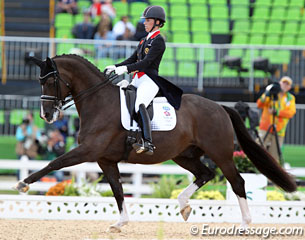 Dujardin spearheaded the British campaign for team silver and her high score was certainly necessary as Spencer Wilton and Fiona Bigwood both could not post their usual scores on the board. It put extra pressure on Carl's shoulders to deliver as not all depended on Dujardin. Carl Hester had Nip Tuck back on the aids and focused on his rider instead of on pokemons hiding around the arena. Still the progress and form that the tall bay Dutch warmblood had shown in Compiegne three months ago, was not there today. The extended trots were not always as regular and through and in the passage the hindlegs were really trailing. Still Hester's smooth riding and beautiful style, especially in the canter work, scored points. The piaffe-passage serpentine was sweet, even though the hindlegs were not taking enough weight in the piaffes. The tempi changes were all correct, but the two's could have had more ground cover. The left pirouette was good but there was a problem in the right one. They finished 9th with 76.485% but they scores ranged from 73.50% to 78.3%.
Dujardin spearheaded the British campaign for team silver and her high score was certainly necessary as Spencer Wilton and Fiona Bigwood both could not post their usual scores on the board. It put extra pressure on Carl's shoulders to deliver as not all depended on Dujardin. Carl Hester had Nip Tuck back on the aids and focused on his rider instead of on pokemons hiding around the arena. Still the progress and form that the tall bay Dutch warmblood had shown in Compiegne three months ago, was not there today. The extended trots were not always as regular and through and in the passage the hindlegs were really trailing. Still Hester's smooth riding and beautiful style, especially in the canter work, scored points. The piaffe-passage serpentine was sweet, even though the hindlegs were not taking enough weight in the piaffes. The tempi changes were all correct, but the two's could have had more ground cover. The left pirouette was good but there was a problem in the right one. They finished 9th with 76.485% but they scores ranged from 73.50% to 78.3%.
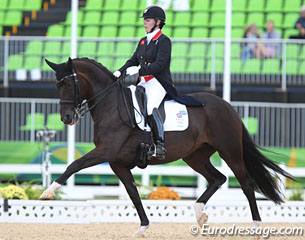 Fiona Bigwood and the delightful Danish mare Orthilia finished 16th with 74.342% which is slightly below par for this combination. The trot extensions are flashy but the mare needs to achieve more overstep. The half pass left was lovely, the one to the right a bit too passagy. Fiona rode super smooth transitions to and from passage. In the collected walk Orthilia anticipated the piaffe too much and get tense. A big issue arose in the second piaffe in which she lost the rhythm and reversed, but Bigwood stayed calm and collected and picked up the movement again. The mare loses some uphill tendency in the canter half passes and a mistake in the two's followed. The first change of the ones was short behind. Also the transition from canter to trot was so so, but they recovered with a well ridden final centerline. They scored 74.342% and finished 16th.
Fiona Bigwood and the delightful Danish mare Orthilia finished 16th with 74.342% which is slightly below par for this combination. The trot extensions are flashy but the mare needs to achieve more overstep. The half pass left was lovely, the one to the right a bit too passagy. Fiona rode super smooth transitions to and from passage. In the collected walk Orthilia anticipated the piaffe too much and get tense. A big issue arose in the second piaffe in which she lost the rhythm and reversed, but Bigwood stayed calm and collected and picked up the movement again. The mare loses some uphill tendency in the canter half passes and a mistake in the two's followed. The first change of the ones was short behind. Also the transition from canter to trot was so so, but they recovered with a well ridden final centerline. They scored 74.342% and finished 16th.
Spencer Wilton and Super Nova landed 21st place with 73.613%. The horse was more forward and energetic than in the Grand Prix, but the trot extensions were not entirely pure in the rhythm. The passage was very lightfooted and balanced, the walk was very clear in the 4-beat rhythm. There was a loss of rhythm in the second piaffe and Wilton made a counting mistake in the one tempi changes.
Back on the Podium, U.S.A. Gets Bronze
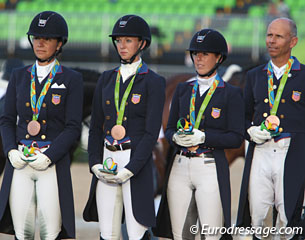 After a 12 year hiatus the American dressage team has reconquered a spot on the Olympic team podium. Their last podium placement was at the 2004 Olympic Games in Athens where now-team trainer Robert Dover competed FBW Kennedy. Dover has always clearly stated that since he has been hired, the goal is only one: gold. And on the road to gold, Olympic bronze has come across their way.
After a 12 year hiatus the American dressage team has reconquered a spot on the Olympic team podium. Their last podium placement was at the 2004 Olympic Games in Athens where now-team trainer Robert Dover competed FBW Kennedy. Dover has always clearly stated that since he has been hired, the goal is only one: gold. And on the road to gold, Olympic bronze has come across their way.
The bronze was definitely no certainty after team riders Kasey Perry-Glass and Steffen Peters could not reach that coveted top form for the day. All depended on a massive score achieved by Laura Graves on Verdades, and that is exactly what she got. Graves placed fifth with her first 80% score in a technical Grand Prix test. Graves' powerhouse gelding Verdades convinced in the trot extensions, wonderful passage, a powerful canter extension, and breath taking tempi changes. The piaffes are still a major stumbling block, but they consistently score 7.5 to 8. The horse can not take the weight on the hind quarters and often swings the hind legs to the side, even though he can achieve a good steady rhythm in them. The exits of both pirouettes needed a bit of fine tuning even though Verdades really sits behind in them. Graves definitely made up for the slack and scored a personal best of 80.644%. Their marks went from 78.7% to 81.8%.
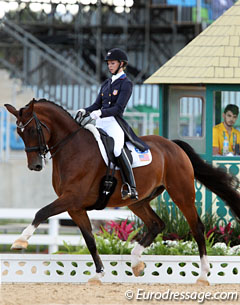 Steffen Peters and Legolas landed 14th place with a more than generous 74.622%. Lately the pair seems to have lost their mojo. Although they were able to get the most out of yesterday's Grand Prix ride, today in the Special Legolas did not look comfortable. He was struggling with the regularity in the extended trot and looked particularly unhappy with the bit. The curb rein put constant pressure on the gaping mouth and the horse hardly foamed at all. There was a break in the left trot half pass. Still the passage was lovely as ever. The Westfalian has really good rhythm and bounce. The onset of the first piaffe was difficult but the second went smoothly. There was much calmness in the two tempi changes and the ones were good and straight. The extended canter was flat with no uphill tendency, but the pirouettes were well executed. Peters picked up points with a very strong final centerline in which the horse was expressive and had much airtime. The piaffe at X was slightly crooked to the right.
Steffen Peters and Legolas landed 14th place with a more than generous 74.622%. Lately the pair seems to have lost their mojo. Although they were able to get the most out of yesterday's Grand Prix ride, today in the Special Legolas did not look comfortable. He was struggling with the regularity in the extended trot and looked particularly unhappy with the bit. The curb rein put constant pressure on the gaping mouth and the horse hardly foamed at all. There was a break in the left trot half pass. Still the passage was lovely as ever. The Westfalian has really good rhythm and bounce. The onset of the first piaffe was difficult but the second went smoothly. There was much calmness in the two tempi changes and the ones were good and straight. The extended canter was flat with no uphill tendency, but the pirouettes were well executed. Peters picked up points with a very strong final centerline in which the horse was expressive and had much airtime. The piaffe at X was slightly crooked to the right.
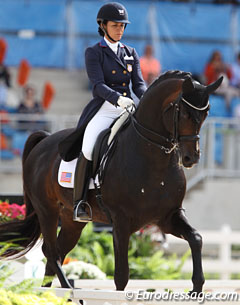 Kasey Perry-Glass and Dublet have little international competition experience outside the bubble atmosphere of the CDI's in Wellington and the lack of mileage cost her today. Dublet is one of those horses with world class quality and all the assets to be an 80%-hitter, but there are still a few issues that need resolving: the contact with the bit being the biggest one. Today the horse regularly flashed the tongue in the trot and canter half passes to the right. The passage is superb with amazing elasticity and airtime, but the dark bay gelding gets behind the vertical. The tempi changes are phenomenal and the piaffe passage serpentine was flawless, but the horse needs to have the nose more out in all these movements. Perry and Dublet could have been one of the sensations at the Olympics, but their moment to shine will come later. They placed 22nd with 73.235%.
Kasey Perry-Glass and Dublet have little international competition experience outside the bubble atmosphere of the CDI's in Wellington and the lack of mileage cost her today. Dublet is one of those horses with world class quality and all the assets to be an 80%-hitter, but there are still a few issues that need resolving: the contact with the bit being the biggest one. Today the horse regularly flashed the tongue in the trot and canter half passes to the right. The passage is superb with amazing elasticity and airtime, but the dark bay gelding gets behind the vertical. The tempi changes are phenomenal and the piaffe passage serpentine was flawless, but the horse needs to have the nose more out in all these movements. Perry and Dublet could have been one of the sensations at the Olympics, but their moment to shine will come later. They placed 22nd with 73.235%.
America's fourth team member, Allison Brock on the Hanoverian stallion Rosevelt, produced the U.S's third best score of 73.824% which ranked her 19th and qualified her for the Kur to Music finals on Monday. The stallion was more open in the throatlatch today which painted a prettier picture of the silhouette. The half passes were sweeping, the walk well ridden. In passage the horse needs to move the hind legs more towards the center of gravity and one piaffe was not enough forward thinking, but the tempi changes were good, despite the swooshing tail.
Disgruntled Dutch, Fourth Place
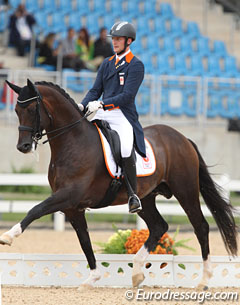 The Dutch team was one percentage point in their average score shy of earning a place on the podium. While the U.S.A had a bronze medal earning average of 76.667%, The Netherlands produced an average of 75.517%. The Dutch riders certainly gave it their all today with Hans Peter Minderhoud and Edward Gal clearly riding as if life depended on it.
The Dutch team was one percentage point in their average score shy of earning a place on the podium. While the U.S.A had a bronze medal earning average of 76.667%, The Netherlands produced an average of 75.517%. The Dutch riders certainly gave it their all today with Hans Peter Minderhoud and Edward Gal clearly riding as if life depended on it.
Diederik van Silfhout became the highest scoring Dutch rider aboard Arlando. The pretty bay has flashy trot extensions but one hoof overstep was the maximum he achieved as the horse gets tight in the topline. The trot half passes were lovely. There was no overtrack in the extended walk. Arlando has much lift in the piaffe and stays very well on the spot. The second piaffe was the best one on the serpentine. The two tempi changes were clear but lacked ground cover, the ones needed a bit more straightness in the hindquarters. In the extended canter the stallion loses the 3-beat rhythm and tightens in the topline instead of swinging and stretching over the back. Van Silfhout always maintained a very steady, quiet contact with the bit. He scored 76.092% for 11th place.
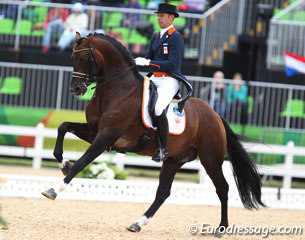 Hans Peter Minderhoud had Johnson on fire in the arena. The bay stallion was electric and sharp. The trot extensions were very expressive and ground covering, the half passes sweeping. In the collected walk the horse got tense. The passage was really nice, with dance-like, elevated steps but he dropped a bit in the poll. In piaffe Johnson gets really narrow behind, but the second piaffe was the best one. One flying change in the two tempi's was not enough through, the ones were good and the extended canter was very powerful and uphill. The pirouettes were well ridden and the final centerline had nice regularity. They scored 75.224% with marks going from 72.1% to 76.7%
Hans Peter Minderhoud had Johnson on fire in the arena. The bay stallion was electric and sharp. The trot extensions were very expressive and ground covering, the half passes sweeping. In the collected walk the horse got tense. The passage was really nice, with dance-like, elevated steps but he dropped a bit in the poll. In piaffe Johnson gets really narrow behind, but the second piaffe was the best one. One flying change in the two tempi's was not enough through, the ones were good and the extended canter was very powerful and uphill. The pirouettes were well ridden and the final centerline had nice regularity. They scored 75.224% with marks going from 72.1% to 76.7%
Edward Gal had Voice much better on the aids today. The black stallion was more through in the bridle, even though he still flashes the tongue on the right side of his mouth. The trot extensions were engaged and with good overtrack but the regularity could have been better. The half passes were big. The passage had much suspension and air time, but the regularity was not always consistent. The piaffes were nicely ridden on the spot, but Voice moves the hindlegs out and hollows his back. In the canter extension the horse looked sour and needed to have the nose more out. The pirouettes were lovely. They scored 73.655% to place 20th.
Quick Notes on Stand Out Rides
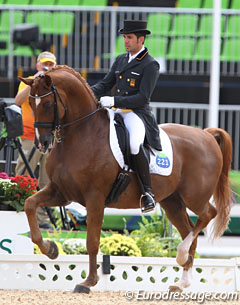 After becoming the crowd favourite in Aachen, Spanish Severo Jurado Lopez continued on his high and extract points from the judges for his rides on the beautiful chestnut Lorenzo. The trot was very energetic and fluent but the extensions were rushed. The combination passage extended trot suits Lorenzo better as he keeps the hind legs more under the body. On the pi-pa serpentine he gets very long in the back with the hindlegs out in passaege, even though he lifts the legs high and has much airtime. There was not enough sit in the first piaffe. The tempi changes were all correct and huge, but the horse swooshed his tail much in them. They scored 77.479% for a stellar sixth place.
After becoming the crowd favourite in Aachen, Spanish Severo Jurado Lopez continued on his high and extract points from the judges for his rides on the beautiful chestnut Lorenzo. The trot was very energetic and fluent but the extensions were rushed. The combination passage extended trot suits Lorenzo better as he keeps the hind legs more under the body. On the pi-pa serpentine he gets very long in the back with the hindlegs out in passaege, even though he lifts the legs high and has much airtime. There was not enough sit in the first piaffe. The tempi changes were all correct and huge, but the horse swooshed his tail much in them. They scored 77.479% for a stellar sixth place.
Swedish Tinne Vilhelmson-Silfven and Don Auriello are always solid for their usual mid seventy percentage score. The pair havd a very nice flow in the trot movements and showed great differentiation between the collectot trot, extended trot and passage. The tempi changes were lovely as well as the pirouettes. Don Auriello has never been the most engaged behind and those shuffling hindlegs in passage are not very appealing, even though Vilhelmson is a master at getting the rhythm extremely regular. The beauty of this pair lies in the exemplary contact with the bridle. Tinne is always soft and light with her hands, the horse is contently chewing on the bit and foaming in the mouth and the horse stays nicely up throughout the test. They scored 77.199% to finish 7th.
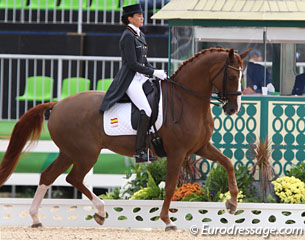 Spanish Beatriz Ferrer-Salat had her act together again on Delgado. In the Grand Prix they made an unusual string of mistakes, and the former Olympic medal winner assured that this would not happen in the Special. Delgado always had the ears pricked in the test and was listening to his rider. The trot extensions were ground covering, there was a hesitant transition to passage but the passage itself was floating and regular as a metronome. The extended walk lacked a bit of overtrack. Their extended canter showed proper lengthening, not only of the stride but also of the frame. The pirouettes and fine centerline was superb. They scored 76.863% to finish 8th.
Spanish Beatriz Ferrer-Salat had her act together again on Delgado. In the Grand Prix they made an unusual string of mistakes, and the former Olympic medal winner assured that this would not happen in the Special. Delgado always had the ears pricked in the test and was listening to his rider. The trot extensions were ground covering, there was a hesitant transition to passage but the passage itself was floating and regular as a metronome. The extended walk lacked a bit of overtrack. Their extended canter showed proper lengthening, not only of the stride but also of the frame. The pirouettes and fine centerline was superb. They scored 76.863% to finish 8th.
Danish Cathrine Dufour is having a blast at her first Olympics. She has qualified for the Kur to Music individual finals after ranking 12th with 76.050% in the Grand Prix Special. Aboard Cassidy Dufour rode a very meticulous differentation between the collected trot work, the passage, the extended trot and their transitions to and from. The passage at the start was not entirely regular with more left hind leg activity. Dufour displayed strong riding in the piaffe-passage serpentine, safe keeping a steady regular rhythm. The two tempi's could have had more ground cover, the ones were super straight. In the extended canter the nose could come more out, even though the stride length does increase properly. There were a few smaller issues that pressed the score down: there was a mistake in the one tempi changes on the centerline, the pirouettes were a bit flat and in both halts the horse stood stretched but square.
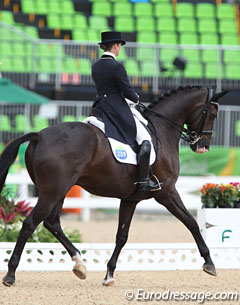 Dufour will be joined by compatriot Anna Kasprzak on her routinier Donnperignon. This duo always performs at a very consistent level with the usual highlights in the trot and canter extensions, pirouettes and flying changes, even though the liver chestnut gets too tight in the neck). The passage work is well regulated, the piaffes small but rhythmical. They were 15th with 74.524%
Dufour will be joined by compatriot Anna Kasprzak on her routinier Donnperignon. This duo always performs at a very consistent level with the usual highlights in the trot and canter extensions, pirouettes and flying changes, even though the liver chestnut gets too tight in the neck). The passage work is well regulated, the piaffes small but rhythmical. They were 15th with 74.524%
Judy Reynolds wrote history by being the first Irish woman to qualify for the individual equestrian medal finals for Ireland. Her black Vancouver K is so beautifully trained. The gelding is not the easiest the ride and has shown his temperament on many occasions by refusing to piaffe, but here in Rio the pair has found their groove and already produced two incredible strong, clean rounds. While Vancouver's trot is quite limited in scope, he has an amazing passage and sits well in piaffe. Reynolds appears a very patient rider and lets her horse get settled in each movement. They scored 74.090% to rank 17th.
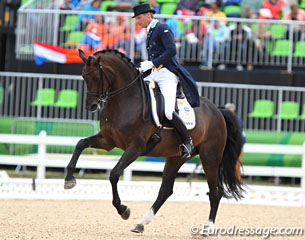 After having to retire in the Special at the 2015 European Championships in Aachen, Patrik Kittel and Deja accomplished their mission this time in Rio and have made it to the kur. The Swedish warmblood mare produced big trot extensions but there was a break into canter in one. The passage was very bouyant and the half passes sweeping. Kittel had Deja steady in the contact. The first piaffe was hesitant and in the passage following the horse was a bit bent to the right. The second piaffe was better with good sit and improved balance. Pity that she lost that balance in the piaffe at X and began to swing heavily with the forehand. Two flying changes in the one tempi's on the centerline were not through and in the two tempi changes on the diagonal the ones the the left were significantly shorter. The extended canter was excellent. They scored 73.866% for an 18th place.
After having to retire in the Special at the 2015 European Championships in Aachen, Patrik Kittel and Deja accomplished their mission this time in Rio and have made it to the kur. The Swedish warmblood mare produced big trot extensions but there was a break into canter in one. The passage was very bouyant and the half passes sweeping. Kittel had Deja steady in the contact. The first piaffe was hesitant and in the passage following the horse was a bit bent to the right. The second piaffe was better with good sit and improved balance. Pity that she lost that balance in the piaffe at X and began to swing heavily with the forehand. Two flying changes in the one tempi's on the centerline were not through and in the two tempi changes on the diagonal the ones the the left were significantly shorter. The extended canter was excellent. They scored 73.866% for an 18th place.
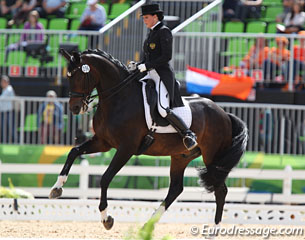 So who is missing from the finals? Two amazing horses were unable to qualify for the Kur after their riders made unfortunate mistakes. Russian Inessa Merkulova has a world super star to ride in Mister X, but the rider sits very unbalanced and leans heavily on the reins and bit to keep her position in the saddle. This results in a horse with a gaping mouth and blue tongue, who still willingly executes the movements with great class. Mister X has a phenomenal piaffe and passage, but loses elasticity in the trot extensions and half passes. The pirouettes are to die for, but in the changes the rider obstructs the flow of her own horse by swinging so heavily in the saddle. Unfortunately, Merkulova went off course and this mistake took a big chunk out of her final score and probably kept her from the finals. She finished 23rd with 73.154%
So who is missing from the finals? Two amazing horses were unable to qualify for the Kur after their riders made unfortunate mistakes. Russian Inessa Merkulova has a world super star to ride in Mister X, but the rider sits very unbalanced and leans heavily on the reins and bit to keep her position in the saddle. This results in a horse with a gaping mouth and blue tongue, who still willingly executes the movements with great class. Mister X has a phenomenal piaffe and passage, but loses elasticity in the trot extensions and half passes. The pirouettes are to die for, but in the changes the rider obstructs the flow of her own horse by swinging so heavily in the saddle. Unfortunately, Merkulova went off course and this mistake took a big chunk out of her final score and probably kept her from the finals. She finished 23rd with 73.154%
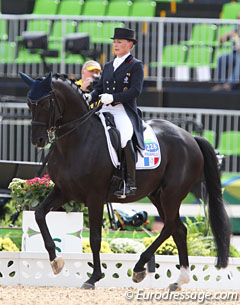 Another horse that certainly earned a spot in the individual kur as it has 80% scoring potential is the French mount Don Luis, ridden by Karen Tebar. This combination is dressage pure, a true example of beautiful riding. The contact is super soft and light, the horse is very willing. He has such a lightfooted and regular passage, a piaffe with true sit and great rhythm, wonderful flying changes, good pirouettes. The whole package is there, but unfortuately there were too many mistakes in the Special. The trot extensions, which are elegant and scopy, is Tebar's "Bete Noire". Her horse has a tendency to skip a beat in the rhythm and he did it again today on the diagonal. Big mistakes in both tempi changes on the diagonal made the score plummet to a 72.773% and 25th place. What a pity.
Another horse that certainly earned a spot in the individual kur as it has 80% scoring potential is the French mount Don Luis, ridden by Karen Tebar. This combination is dressage pure, a true example of beautiful riding. The contact is super soft and light, the horse is very willing. He has such a lightfooted and regular passage, a piaffe with true sit and great rhythm, wonderful flying changes, good pirouettes. The whole package is there, but unfortuately there were too many mistakes in the Special. The trot extensions, which are elegant and scopy, is Tebar's "Bete Noire". Her horse has a tendency to skip a beat in the rhythm and he did it again today on the diagonal. Big mistakes in both tempi changes on the diagonal made the score plummet to a 72.773% and 25th place. What a pity.
Text and photos © Astrid Appels - No reproduction allowed
Related Links
Eurodressage Coverage of the 2016 Olympic Games